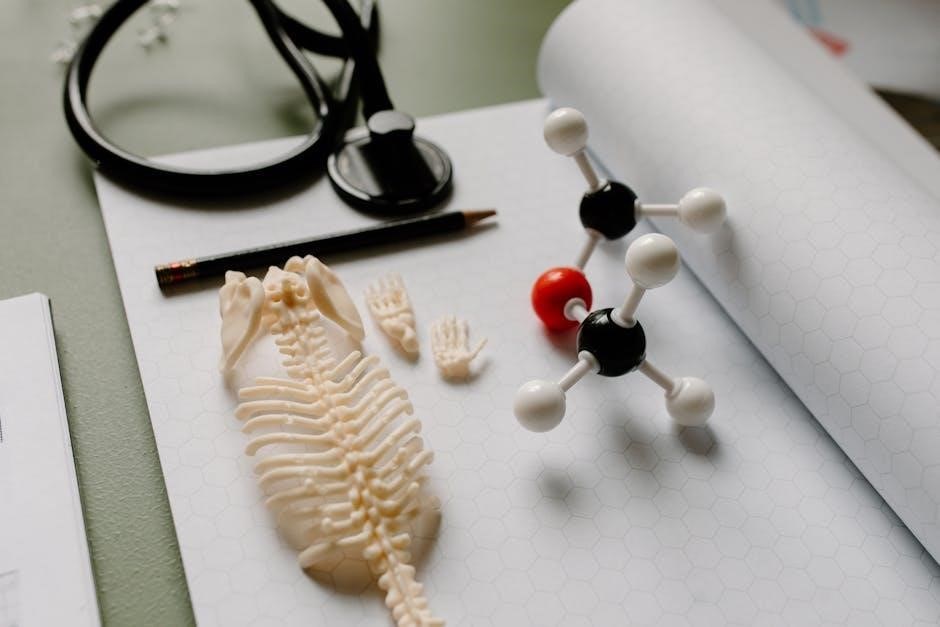The study guide for fundamentals of nursing provides a comprehensive overview of essential concepts, review questions, and practical exercises to master nursing skills and principles effectively.
1.1 The Evolution of Nursing as a Profession
Nursing has transformed from a vocational calling into a highly respected, evidence-based profession. Historical figures like Florence Nightingale laid the groundwork, emphasizing compassion and scientific care. Modern nursing integrates technology, research, and interdisciplinary collaboration, focusing on patient-centered care and holistic health. The study guide highlights this evolution, showcasing how nursing has adapted to societal needs, advancing from rudimentary care to specialized practices that prioritize patient outcomes and professional growth.
1.2 Scope and Importance of Nursing in Healthcare
Nursing plays a vital role in healthcare, encompassing patient care, education, and support across diverse settings. Nurses are integral to promoting health, preventing disease, and managing chronic conditions. Their scope extends from acute care to community health, emphasizing holistic, patient-centered approaches. The study guide underscores nursing’s importance in improving patient outcomes, advocating for health equity, and collaborating within interdisciplinary teams. Nursing’s role is fundamental to the healthcare system’s effectiveness and adaptability in meeting evolving patient needs and societal demands.

Key Concepts and Principles in Nursing
The study guide covers fundamental concepts like vital signs, patient assessment, and infection control, providing a solid foundation for understanding nursing principles and preparing for NCLEX-style questions.
2.1 Vital Signs and Patient Assessment
The study guide emphasizes the importance of accurately measuring vital signs, such as temperature, pulse, and blood pressure, as foundational skills in patient assessment. Review questions and exercises help reinforce understanding of normal and abnormal findings, enabling students to identify patterns and deviations. Practical tools, such as flashcards, aid in memorizing assessment techniques and interpreting symptoms. This section prepares learners to collect and analyze data effectively, laying the groundwork for accurate nursing diagnoses and interventions in clinical practice. Mastering these skills is crucial for safe and effective patient care.
2.2 Health Patterns and Nursing Diagnosis
The study guide explores health patterns, focusing on identifying normal and abnormal physiological, psychological, and social responses. It provides strategies for formulating accurate nursing diagnoses based on comprehensive patient assessments. Review questions and exercises help students analyze health patterns, prioritize care, and develop individualized plans. This section emphasizes the importance of evidence-based practice in diagnosing and addressing patient needs effectively, ensuring holistic and patient-centered care. Mastery of health patterns and nursing diagnosis is essential for delivering high-quality nursing interventions;

The Nursing Process
The nursing process involves systematic assessment, diagnosis, planning, implementation, and evaluation to deliver individualized care, ensuring optimal patient outcomes and continuous improvement in practice.
3.1 Assessment: Collecting Patient Data
Assessment is the first step in the nursing process, involving the collection of comprehensive patient data through vital signs, physical examinations, and health histories. This step ensures accurate baseline information, identifying deviations from normal and informing subsequent care decisions. Effective assessment skills are crucial for developing individualized care plans and promoting positive patient outcomes. Study guides emphasize the importance of thorough data collection to guide the entire nursing process.
3.2 Diagnosis: Identifying Nursing Problems
Diagnosis in nursing involves analyzing assessment data to identify actual or potential health issues. Nurses formulate specific nursing diagnoses based on patient responses to health conditions or treatments. This step is crucial for prioritizing care and developing targeted interventions. Study guides highlight the importance of accurate diagnosis in ensuring effective care planning and improving patient outcomes through evidence-based practices and critical thinking.
3.3 Planning: Setting Goals and Outcomes
Planning involves creating individualized care plans with clear, measurable goals and outcomes. Nurses set SMART (Specific, Measurable, Achievable, Relevant, Time-bound) goals based on the patient’s diagnosis and needs. This step ensures interventions are focused and effective. Study guides emphasize the importance of prioritizing goals and collaborating with patients to enhance adherence. Effective planning aligns with evidence-based practices, promoting optimal patient outcomes and facilitating smooth transitions in care delivery.
3.4 Implementation: Executing the Care Plan
Implementation involves delivering care as outlined in the plan, ensuring interventions are evidence-based and patient-centered. Nurses execute tasks, administer medications, and provide education. Effective communication and documentation are crucial during this phase. Study guides highlight the importance of adhering to care plans while remaining flexible to address evolving patient needs. This step requires coordination with the healthcare team to ensure interventions are timely and aligned with patient goals, promoting safe and effective care delivery.
3.5 Evaluation: Assessing Patient Outcomes
Evaluation involves assessing whether patient outcomes align with the established goals and care plan. Nurses compare actual outcomes with expected results, using tools like NCLEX-style questions to reinforce understanding. This phase ensures the effectiveness of interventions and identifies areas for improvement. Documentation and feedback are critical to reflect on care quality and adjust future plans. Study guides emphasize the importance of timely and accurate evaluation to promote positive patient outcomes and continuous learning in nursing practice.

Clinical Skills and Procedures
Clinical skills and procedures are essential for nursing practice, including physical assessments and infection control. The study guide provides detailed insights and exercises to master these skills effectively.
4.1 Physical Assessment Techniques
Physical assessment techniques are core skills in nursing, involving the evaluation of vital signs, pain levels, and other physiological indicators. The study guide provides detailed exercises and review questions to help master these techniques. It emphasizes the importance of accurate data collection and documentation. Through practical scenarios and case studies, students can refine their ability to perform comprehensive assessments. These skills are essential for identifying patient needs and informing care plans effectively in real-world clinical settings.
4.2 Infection Control and Safety Measures
Infection control and safety measures are critical in nursing practice to prevent the spread of pathogens. The study guide emphasizes proper hand hygiene, use of personal protective equipment (PPE), and sterilization techniques. It also covers isolation protocols and safe handling of sharps. Safety measures include adhering to chemical safety guidelines and proper waste disposal. These practices are essential for protecting both patients and healthcare workers, ensuring a safe clinical environment. The guide provides exercises to reinforce these critical skills effectively.
Health Promotion and Disease Prevention
Health promotion involves educating patients on healthy lifestyles, preventive care, and wellness strategies. Disease prevention focuses on vaccinations, screenings, and early detection to reduce health risks effectively.
5.1 Patient Education Strategies
Patient education strategies are crucial for empowering individuals to manage their health effectively. Nurses should tailor education to the patient’s understanding, using clear, simple language and visual aids. Incorporating culturally sensitive materials ensures accessibility for diverse populations. Active learning techniques, such as demonstrations and hands-on practice, enhance engagement. Encouraging questions and addressing concerns fosters trust and adherence to care plans. Effective education promotes self-care, disease prevention, and improved health outcomes, making it a cornerstone of nursing practice.
5.2 Preventive Care and Wellness Programs
Preventive care and wellness programs are essential for promoting health and reducing disease risks. Nurses play a key role in implementing these initiatives, which include vaccinations, health screenings, and education on healthy lifestyles. These programs focus on early detection and management of potential health issues, enhancing overall well-being. By advocating for regular check-ups and wellness practices, nurses help communities adopt healthier habits, leading to improved health outcomes and reduced healthcare costs over time.

Legal and Ethical Considerations
Understanding nursing laws, regulations, and ethical dilemmas is crucial for safe and professional practice, ensuring patient rights and dignity are upheld in all care settings.
6.1 Nursing Laws and Regulations
The study guide emphasizes understanding nursing laws and regulations to ensure safe practice. It covers legal frameworks, patient rights, and professional standards, helping nurses navigate ethical and legal challenges. Key topics include licensure requirements, the Nurse Practice Act, and HIPAA guidelines. Exercises and case studies provide practical applications, ensuring compliance and accountability in healthcare settings. This section is essential for preparing students to meet legal standards and deliver high-quality, patient-centered care responsibly.
6.2 Ethical Dilemmas in Nursing Practice
The study guide explores ethical dilemmas in nursing, such as confidentiality, end-of-life decisions, and patient autonomy. It provides case studies and exercises to help nurses develop moral reasoning and decision-making skills. Key topics include cultural competence, resource allocation, and managing conflicts between patient wishes and medical advice. The guide emphasizes the importance of empathy, professionalism, and adhering to ethical frameworks like the ANA Code of Ethics to address complex situations compassionately and responsibly.

Critical Thinking and NCLEX Preparation
The study guide emphasizes critical thinking and NCLEX preparation with practice questions and test-taking strategies to enhance nursing students’ skills and understanding for success.
7.1 Practicing NCLEX-Style Questions
The study guide includes NCLEX-style questions to help nursing students practice critical thinking and problem-solving skills. These questions cover a wide range of topics, from fundamental concepts to complex clinical scenarios. Regular practice with these questions enhances test-taking strategies, time management, and the ability to prioritize care. Detailed rationales are provided for each question to reinforce learning and improve performance. This structured approach ensures students are well-prepared for the NCLEX exam and confident in their understanding of nursing principles.
7.2 Test-Taking Strategies for Success
Mastering test-taking strategies is crucial for success in nursing exams. The study guide emphasizes techniques like active learning, time management, and prioritization. Strategies include skimming questions, identifying key terms, and eliminating incorrect answers. Practicing under timed conditions helps build confidence and reduces anxiety. Focused review of rationales and common pitfalls further enhances understanding. These strategies are tailored to help nursing students approach exams systematically, ensuring they perform at their best and achieve their goals effectively.

Additional Resources for Nursing Students
Nursing students can benefit from e-books, video tutorials, and interactive simulations that complement traditional study guides, enhancing their learning experience and practical application of nursing concepts.
8.1 Recommended Study Guides and Books
Top-rated study guides like the Fundamentals of Nursing Study Guide and textbooks such as Fundamentals of Nursing by Patricia Potter offer in-depth insights and practice questions. These resources cover key concepts, procedures, and skills, aiding students in mastering nursing fundamentals. They are structured to align with course curriculums, ensuring comprehensive understanding and application. Additional resources include flashcards and e-books, providing flexible learning options for students to excel in their studies and professional development.
8.2 Flashcards and Online Learning Tools
Flashcards, such as NCLEX Fundamentals Flashcards, and online platforms like Quizlet, offer interactive ways to memorize key terms and concepts. These tools are designed to enhance retention and understanding, especially for exam preparation. Many flashcard sets cover topics like assessment, diagnosis, and planning, aligning with nursing fundamentals. Online learning tools also provide practice questions, simulations, and interactive activities, making learning engaging and effective for nursing students seeking to master foundational knowledge and critical thinking skills.
8.3 Webinars and Nursing Communities
Webinars and nursing communities offer valuable resources for nursing students, providing insights into clinical applications, real-world scenarios, and expert advice. These platforms foster engagement through live Q&A sessions, case studies, and interactive discussions. Nursing communities also enable peer-to-peer learning, sharing of study materials, and professional networking. By participating in these, students gain practical knowledge and support, enhancing their understanding of nursing fundamentals and preparing them for real-world challenges in healthcare settings. These tools are essential for continuous learning and professional growth.